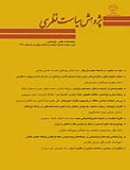«خود» و «دیگری» در اندیشه مهدی بازرگان
محورهای موضوعی : پژوهش سیاست نظری
حمزه عالمی چراغعلی
1
![]() ,
سیدعلیرضا حسینی بهشتی
2
,
سیدعلیرضا حسینی بهشتی
2
1 - اندیشه سیاسی، دانشگاه تربیت مدرس
2 - دانشگاه تربیت مدرس
کلید واژه: مهدی بازرگان مارتین بوبر بیناسوژگی الهیات ارتباطی سوبژکتویته معنویّتگرا,
چکیده مقاله :
رابطه مطلوب «خود» و «دیگری» به معنای مواجهه بیناسوژگی، رویکردی انتقادی به مدرنیته است و به دفاع از انسان در مقابل سیطره عقل ابزاری مدرن میپردازد. این موضوع از سوی متفکران فلسفه وجودی ارائه شده و «مارتین بوبر»، صورت بندی نسبتاً روشنی از آن ارائه می کند. بررسی این موضوع در تفکرات نواندیشان دینی که نگاه انتقادی به مدرنیسم دارند، اهمیت دارد. «مهدی بازرگان» به عنوان یکی از نواندیشان دینی متقدم، در جهت مسئله اصلی اش که پیوند دین و مدرنیته است، بر اساس انسان شناسی دینی اش، سوژه ایرانی را با رویکردی معنوی برمی افرازد و به این ترتیب ارتباط مبنایی میان انسان دینی با مفاهیم مدرن برقرار می کند. این ارتباط در نوع مواجهه «خود» و «دیگری» در تفکر او نمود روشنی دارد. بازرگان، «انسان الهی- اجتماعی» را در کانون تفکر خود قرار می دهد و از این جهت مقوّمات مواجهه مطلوب «خود» و «دیگری» و همزمان پیوند مناسب تر انسان دینی با دنیای مدرن را فراهم می کند.
The desirable relationship between "the self" and "the other" as the encounter of intersubjectivity, is a critical approach to modernity and defends humanity against the domination of Instrumental wisdom. The thinkers of existential philosophy present this, and Martin Buber provides a clear theoretical formulation. It is important that we examine this issue in the Religious Intellectualism, which has a critical point of view to modernism. Mehdi Bazargan, as one of the forerunners of the Religious Intellectualism, addresses the issue of religion and modernity based on his religious anthropology and create an “Iranian Subject” with a “Spiritual approach” that, thus, establishing a fundamental link between religious man and modern concepts. This connection is evident in the form of confrontation of "the self" and "the other" in his thinking. Bazargan places the divine-social man in the center of his thinking, and thus providing the conditions for the "the self" and "the other" favorable attitudes and simultaneously linking religion and modernity.
